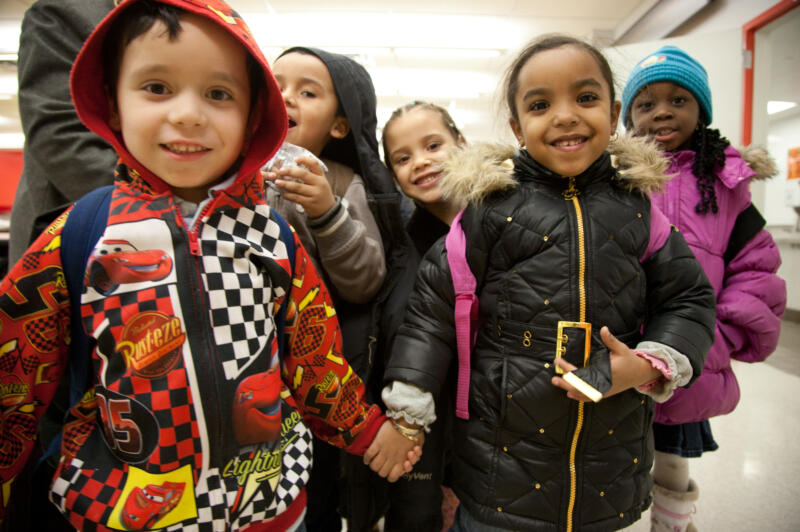A Literacy New Deal? Partnering to Strengthen Literacy
Dear PASE Network,
PASE and ExpandED Schools recently held a strategic discussion on literacy. We are sharing a summary of that conversation with the field, and look forward to building partnerships in this effort.
Staffing and capacity affect this topic as well as many others, and we are resharing our earlier summary on staffing issues in the afterschool field as well.
We hope you will share these reports with your colleagues, and we look forward to partnering with you as we address these issues.
-- Partnership for After School Education
Introduction
In New York City, approximately two of every three children living in poverty cannot read at grade level, and if they do not have the support to catch up by third grade, they are thirteen times more likely not to graduate from high school on time.(i) In 2019, only 47% of elementary and middle school students scored as proficient in reading, with significant gaps between BIPOC and white students as well as for students in economically-marginalized communities.(ii) Approximately 13% of New York City students are English Language Learners and face the dual challenge of simultaneously building literacy skills and learning a second language.(iii) Though the data remains to be analyzed, the pandemic has caused unprecedented academic disruptions that are creating a literacy crisis.
Community-based organizations (CBOs) play a significant role in supporting literacy. CBOs deliver literacy enrichment in afterschool and summer programs; literacy interventions through push-in programs during the school day; and an array of hands-on learning activities that help build children’s contextual knowledge and vocabulary. CBOs can be a key partner as schools work to advance literacy.
On December 3, 2021, ExpandED Schools and PASE convened a group of stakeholders from youth-serving nonprofits, social services agencies, higher education, and city government to discuss these literacy challenges and the opportunity presented by school/CBO partnerships. This paper offers a summary of the themes of the discussion as well as ideas for change and action steps.
Discussion Themes
The need for literacy support has gone from significant to overwhelming as a result of the pandemic. Since the start of the school year, it has become evident that more students need help with reading and writing. Classroom and program observations suggest more students are asking for help, which stretches teachers and afterschool staff who are already facing burnout due to increased demands and staffing shortages. Reading programs typically offered to Kindergarten and 1st grade students are being requested for older students who have fallen behind.
The value of CBOs and social/emotional learning has become more prominent. In a nod to the Maslow-before-Bloom philosophy of meeting students’ basic needs as a necessary step toward academic learning, schools and families are asking for more support with skills damaged by the pandemic. Coming back to school after months of social isolation has led students to need support with communication, self-regulation, and other social and emotional competencies. Principals seem ready to tackle these challenges with their CBO partners, perhaps as a result of closer collaboration in implementing the Summer Rising program.
Staffing shortages are hindering literacy advancements. Schools and CBOs are both experiencing a significant number of staff vacancies due to the pandemic. CBO staff reported being pulled in many directions, and when new hires are made there is an added challenge of having to onboard staff over and over again. As one CBO leader said, they are not able to prepare staff on how to deliver strong literacy interventions because they have to focus on basic training (e.g., health and safety) given the number of new staff members and the demands of leading programs during a pandemic.
Technology is an opportunity and a challenge. Digital literacy and reading platforms have been especially important during remote learning and as a tool for remediation over the last year and a half. However, we also see emerging trends suggesting students are less interested in reading paper books and are using digital literacy shortcuts such as voice-to-text rather than practicing their writing. These new habits can strain curricula, instructional practices, and enrichment models that rely on more traditional methods of reading and writing.
When planning literacy interventions, precision and partnership are key. While all CBO partners have a significant role to play in delivering literacy intervention – leading book clubs, developing vocabulary through exposure, and inspiring a joy of reading in young learners – some CBOs have specialized expertise in literacy and now is the time to expand their reach and impact. When CBO leaders are able to inform principals about the literacy activities they offer in their afterschool programs, these activities are still rarely linked explicitly to school-day strategies and objectives in ways that could benefit young people. In addition, CBOs focusing on literacy can play an elevated role in bringing evidence-based curricula and staff training to schools and to other CBOs that do not specialize in literacy. At the individual school level, sharing diagnostic data with CBOs can also serve as a way to deliver more individualized literacy interventions.
Ideas to Improve Literacy
Solutions generated, listed below, range from short-term fixes to long-term system changes. All are feasible under the right policy and practice conditions.
- Encourage increased collaboration between schools and literacy-focused CBOs with additional funding and opportunities to educate principals on how CBOs can support literacy among their students
- Use hybrid and asynchronous training and tools to build capacity of CBO program staff to deliver strong literacy supports and interventions on a flexible schedule given multiple and conflicting demands on their time
- Partner with CUNY to build a pipeline of student teachers who can staff afterschool and summer programs
- Reexamine pay scales/job titles and public funds available to invest in youth development professionals, ensuring the field can attract the talent needed to advance literacy
- Consider individualizing out-of-school time program enrollment beyond one’s home school, allowing students and families to select a program that best meets their needs rather than having to attend their assigned school-based program
- Develop a bank of curricula, interventions, and partners that reflect evidence-based, culturally-responsive practices to respond to school needs in a nimble, flexible manner (I.e., avoid one-size-fits-all offerings)
Action Steps
As a result of the strategic discussion and needs identified in the field, ExpandED Schools and PASE commit to the following action steps.
- Communicate ideas discussed to key partners at CUNY, DOE, and DYCD
- Host a follow-up discussion specific to culturally-responsive literacy practices (curricula, books, assessment, instruction, etc.)
- Continue to use and support hybrid and asynchronous professional development in literacy and related topics (e.g., SEL, culturally-responsive practice)
- Explore ways to expand/launch literacy training for afterschool providers with a focus on using literacy data and deploying evidence-based interventions and enrichment
- Support a professional learning community among CBOs and literacy-focused non-profits to continue exploring opportunities to learn from and support one another
Acknowledgments
We thank the following participants in the strategic discussion that led to this paper, who lent their leadership and ideas to the conversation.
- Jaynemarie Angbah, Charles and Lynn Schusterman Family Philanthropies
- Farhad Asghar, Carnegie Corporation of New York
- Katie Aylwin, WHEDco
- Marcos Clander, Read Alliance
- Betsy Cohen, Youth Communication
- Erica Doherty, Literacy Trust
- Nick Ferreira, The Child Center of NY
- Andrew Fletcher, NYC Department of Education
- Tim Fredrick, Youth Communication
- Ruth Genn, The Heckscher Foundation for Children, and Literacy Academy Collective
- Be Jensen, Literacy Assistance Center
- Michele Kotler, Community-Word Project
- Emma Laz-Hirsch, CAMBA
- Megan McAllister, Altman Foundation
- Salma Muro, Literacy Trust
- Christina Oliver, Read to Lead
- Erica Oquendo, Cypress Hills Local Development Corporation
- Danielle Pulliam, The Pinkerton Foundation
- Maggie Ritter, Read to Lead
- Kim Sweet, Advocates for Children of New York
- Laura Walsh, Literacy Inc.
- Margie Weiner, DREAM
- Phylisa Wisdom, Literacy Trust
We also thank the ExpandED Schools and PASE staff and consultants who participated in and led the session:
ExpandED Schools:
- Tarilyn Little, Early Literacy Manager
- Joel Nuñez, Director, Early Literacy
- Saskia Traill, President and CEO
PASE:
- Shreya Malena-Sannon, Chief Program Officer
- Alison Overseth, CEO
- Jen Siaca Curry, Special Advisor
About ExpandED Schools
ExpandED is dedicated to ensuring that all young people have access to enriching learning opportunities that affirm their identities, teach them valuable skills, and spark new possibilities. ExpandED envisions a vibrant, stable, and equitable publicly-funded system of school-community partnerships so that all New York City children thrive. We unite program development, capacity-building, research and advocacy to drive educational equity and realize this vision.
About PASE
PASE exists to improve the quality of afterschool programs for children and teens living in poverty. PASE recognizes the crucial role afterschool programs play in fostering young people's intellectual, emotional, physical and spiritual growth. PASE believes that all kids deserve a safe, nurturing space during out-of-school time where they have opportunities to explore their passions while connecting with and learning from caring adults.
All young people deserve the right to succeed. PASE is determined to ensure we do everything possible to make a bright future possible for New York City's kids.


